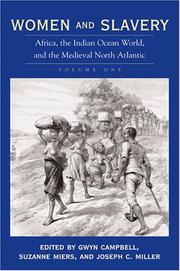| Listing 1 - 3 of 3 |
Sort by
|

ISBN: 9780821417249 9780821417263 Year: 2008 Publisher: Athens : Ohio University Press,
Abstract | Keywords | Export | Availability | Bookmark
 Loading...
Loading...Choose an application
- Reference Manager
- EndNote
- RefWorks (Direct export to RefWorks)
The literature on women enslaved around the world has grown rapidly in the last ten years, evidencing strong interest in the subject across a range of academic disciplines. Until Women and Slavery, no single collection has focused on female slaves who--as these two volumes reveal--probably constituted the considerable majority of those enslaved in Africa, Asia, and Europe over several millennia and who accounted for a greater proportion of the enslaved in the Americas than is customarily acknowledged. Women enslaved in the Americas came to bear highly gendered reputations among whites--as "scheming Jezebels," ample and devoted "mammies," or suffering victims of white male brutality and sexual abuse--that revealed more about the psychology of enslaving than about the courage and creativity of the women enslaved. These strong images of modern New World slavery contrast with the equally expressive virtual invisibility of the women enslaved in the Old--concealed in harems, represented to meddling colonial rulers as "wives" and "nieces," taken into African families and kin-groups in subtlely nuanced fashion. Women and Slavery presents papers developed from an international conference organized by Gwyn Campbell.
Women slaves --- Slavery --- Femmes esclaves --- Esclavage --- History. --- Histoire --- Sklaverei. --- Sklavin. --- Women slaves. --- Atlantischer Ozean --- Indischer Ozean --- Frau. --- Slavery. --- Afrika. --- Enslaved women
Book
ISBN: 9780812224184 Year: 2016 Publisher: Philadelphia : PENN University of Pennsylvania Press,
Abstract | Keywords | Export | Availability | Bookmark
 Loading...
Loading...Choose an application
- Reference Manager
- EndNote
- RefWorks (Direct export to RefWorks)
In the eighteenth century, Bridgetown, Barbados, was heavily populated by both enslaved and free women. Though their stories appear only briefly in historical records, Marisa J. Fuentes creates a portrait of urban Caribbean slavery in this colonial town from the perspective of these women. Fuentes takes us through the streets of Bridgetown with an enslaved runaway, inside a brothel run by a freed woman of color, in the midst of a white urban household in sexual chaos, to the gallows where enslaved people were executed, and with violent scenes of enslaved women's punishments. In the process, Fuentes interrogates the archive and its historical production to expose the ongoing effects of white colonial power that constrain what can be known about these women. Combining fragmentary sources with interdisciplinary methodologies that include black feminist theory and critical studies of history and slavery, Dispossessed lives demonstrates how the construction of the archive marked enslaved women's bodies, in life and in death. By vividly recounting enslaved life through the experiences of individual women and illuminating their conditions of confinement through the legal, sexual, and representational power wielded by slave owners, colonial authorities, and the archive, Fuentes challenges the way we write histories of vulnerable and often invisible subjects. --
Enslavement --- Ethnic relations. --- Human Rights --- Sklavin. --- Slavery --- Slavery. --- Women slaves --- Women slaves --- Women --- Women --- Women's Rights --- History. --- History. --- History --- Social conditions --- Social conditions. --- Social conditions --- Social conditions. --- History. --- 1700-1799. --- Barbados --- Barbados. --- Bridgetown (Barbados) --- Bridgetown --- Ethnic relations --- History
Book
ISBN: 9783515125130 9783515125147 Year: 2020 Publisher: Stuttgart Steiner
Abstract | Keywords | Export | Availability | Bookmark
 Loading...
Loading...Choose an application
- Reference Manager
- EndNote
- RefWorks (Direct export to RefWorks)
Aufgrund seiner Zugehörigkeit zur Mitgift ist der Mitgiftsklave (servus dotalis) eng mit dem römischen Mitgiftrecht verknüpft – dies unterscheidet ihn von anderen Sklaven und macht sein Schicksal abhängig von schwer prognostizierbaren und potenziell widerstreitenden Interessen der Eheleute. Benedikt Forschner untersucht Probleme, die aus diesem Spannungsfeld resultieren: Welche Antworten fanden die römischen Juristen auf Fragen der Eigentumsverhältnisse, des Erwerbs und der Freilassung von Mitgiftsklaven? Wie gestalteten sich die Zurückbehaltungsrechte des Ehemannes im Fall einer Scheidung? Hatte der Ehemann Ersatzpflichten gegenüber der Ehefrau bei dem Verlust, einer Verletzung oder einer Krankheit des Sklaven? Wer haftete für Delikte, die der Mitgiftsklave begangen hatte? Und wie sah das rechtliche Schicksal seiner Kinder aus? Ergänzend beleuchtet Forschner den Mitgiftsklaven aus sozialhistorischer Perspektive, insbesondere mit Blick auf Geschlechts- und Altersstrukturen, Bildung, Tätigkeiten und seine geographische Verbreitung.
Slavery (Roman law) --- Dowry (Roman law) --- Dot (Droit romain --- Esclavage (Droit romain) --- E-books --- Römisches Recht --- Sklave --- Mitgift --- (Produktform)Electronic book text --- Antike --- Asinaria --- Dotalrecht --- Dotalsklave --- Freilassung des Sklaven --- Impensen --- Mitgiftsklave --- Plautus --- Retentionsrechte --- Saurea --- actio rei uxoriae --- dominium --- dos --- impensae modicae --- impensae neccessariae --- impensae utiles --- manumissio --- partus ancillae --- römischer Eigentumsbegriff --- römisches Mitgiftrecht --- römisches Privatrecht --- servus dotalis --- (VLB-WN)9553 --- Freigelassener --- Sklaverei --- Unfreier --- Sklavin --- Versklavung --- Aussteuer --- Ausstattung --- Romanistik --- Römisches Reich
| Listing 1 - 3 of 3 |
Sort by
|

 Search
Search Feedback
Feedback About UniCat
About UniCat  Help
Help News
News